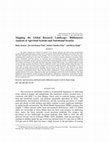Papers by Prof. Satish Chandra Pant

Indian journal of agricultural economics, 2023
The study examined the evolution of research on the linkages between agri-food systems and nutrit... more The study examined the evolution of research on the linkages between agri-food systems and nutritional security globally using bibliometric analysis of 1057 documents listed in SCOPUS database from 1984 to May 2023. The study identified major keywords in the literature, such as food security, India, nutrition, and climate change, establishing their significance in the field. The analysis of co-occurrence networks identified a prominent cluster named "sustainable agri-food systems for achieving food and nutritional security," emphasising sustainable approaches in agriculture and food systems to ensure both food and nutritional security. Evolution of themes in the 21st Century was analysed in this study under three-time spans. During 2000-10, there was a global emphasis on food security focusing on Asian and African countries, nutritional security received little attention during this span. The second time slice (2011-19) witnessed the emergence of research on nutritional security, which included a variety of topics such as gender, dietary diversity, breeding, and food security. The third time slice (2020-23) was largely concerned with establishing measures for mitigating climatic change, abiotic stresses, and the impacts of the Covid-19 pandemic on nutritional security. These research efforts contributed to a better understanding of the complex interplay between food security, nutritional security, and the challenges posed by the Covid-19 pandemic. The study emphasised on the futuristic research ensuring interdisciplinary collaboration, technological advancements, holistic approach to achieve long-term food and nutritional security, climate adaptation, biodiversity, and ensuring equitable access to nutritious food.
Agricultural Economics Research Review, 2024
The study quantifies the impact of the Covid-19 pandemic on the bilateral agricultural trade betw... more The study quantifies the impact of the Covid-19 pandemic on the bilateral agricultural trade between India and China using the Interrupted Time Series Analysis (ITSA) technique. India’s agricultural exports to China increased by approximately 48 per cent post-Covid-19. The post-pandemic, cumin exports to China increased significantly due to increasing health concerns. The exports of castor oil and groundnut shot up as well. Conversely, the exports of frozen fish, shrimps, and prawns declined. However, India’s agricultural imports from China, primarily fertilizers, displayed a volatile pattern. An immediate shock was observed in the case of urea and DAP imports, but the declines were not persistent for a long
time.

Journal of Regional and Rural Studies (RRS), 2023
Tourism is one of the government's leading sectors that contributes significantly to the country'... more Tourism is one of the government's leading sectors that contributes significantly to the country's foreign exchange receipts. One of the strategies of the tourism sector to continue to trigger economic growth is to develop sustainable tourism through the Tourism Village program. Tourism village development requires the collective involvement of local communities to ensure the program's sustainability. The availability and utilization of social capital influence community participation in tourism development. This study aims to identify how social capital affects community participation in developing the Bejijong Tourism Village program. The population in this study includes the heads of families of tourism actors, with a total sample of 279 households. The variables used are social capital variables consisting of social networks, trusts, social norms, and participation variables at the implementation stage. The analysis used is the Structural Equation Model (SEM) to determine the constituent factors contributing to each variable, thereby facilitating an understanding of the specific factors that merit attention for improvement and those that should be upheld to optimize tourism performance. The results of the analysis show that social capital significantly influences community participation. The better the social capital in Bejijong Village, the more people will be willing to participate in developing tourism villages. The social capital variable with the highest influence on participation is the trust variable. Therefore, the community must uphold the optimality of factors influencing trust for the sustainability of tourism development.
ICIMMI 2023, 2023
By automating processes, improving decision-making, and altering the parameters of legal practice... more By automating processes, improving decision-making, and altering the parameters of legal practice, artificial intelligence (AI) is reinventing the legal profession. This study examines the many ramifications of AI in the legal system, emphasizing its revolutionary potential and moral dilemmas. The paper examines how well-liked AI technologies are among legal professionals, looks into privacy issues raised by networked AI bots, and imagines the emergence of AI lawyers who can make and present cases on their own. In light of technical breakthroughs, the research paper emphasizes the necessity for fair regulation, moral AI development, and the preservation of fundamental legal principles.
Empirical Economics Letters, 2023
Agriculture sector in India is in the transition phase, witnessed various issues in the past, suc... more Agriculture sector in India is in the transition phase, witnessed various issues in the past, such as lack of transparency and accountability to farmers etc., to overcome these issues, understanding of process, operations, and contemporary practices in the area of blockchain is required to strengthen farm businesses and farmers" income. Hence, this study is an attempt to synthesize the systematic review highlighting issues, and emerging domains from the extant literature and provide a blueprint for further study/research in the area of technological advancement and Agribusiness opportunities to various stakeholders for better utilization of the blockchain operations, its use and scope.

Journal of Agribusiness in Developing and Emerging Economies
PurposeThis paper aims to examine the impact of social capital and self-efficacy in the performan... more PurposeThis paper aims to examine the impact of social capital and self-efficacy in the performance of producer organizations. It also tests the mediating influence of self-efficacy in the relationship of social capital and performance of producer organizations.Design/methodology/approachThe study used data from a survey of 226 members of farmer producer organizations (FPO) in India. The model was tested through structural equation modeling wherein all hypotheses were tested using “R” studio.FindingsThe findings reveal that social capital and self-efficacy play a significant role in predicting the performance of FPO. It was found that in the process of social capital influencing the performance of FPO, self-efficacy plays a significant role as a partial mediator with a mediating effect of approximately 69.28%.Research limitations/implicationsThe study considered only one antecedent while identifying the reasons for perceived performance of FPOs. Hence, further studies of the various...
INTERNATIONAL JOURNAL OF COMMERCE AND BUSINESS MANAGEMENT, 2015

Indian Journal of Agricultural Economics, 2023
The study examined the evolution of research on the linkages between agri-food systems and nutrit... more The study examined the evolution of research on the linkages between agri-food systems and nutritional security globally using bibliometric analysis of 1057 documents listed in SCOPUS database from 1984 to May 2023. The study identified major keywords in the literature, such as food security, India, nutrition, and climate change, establishing their significance in the field. The analysis of co-occurrence networks identified a prominent cluster named "sustainable agri-food systems for achieving food and nutritional security," emphasising sustainable approaches in agriculture and food systems to ensure both food and nutritional security. Evolution of themes in the 21st Century was analysed in this study under three-time spans. During 2000-10, there was a global emphasis on food security focusing on Asian and African countries, nutritional security received little attention during this span. The second time slice (2011-19) witnessed the emergence of research on nutritional security, which included a variety of topics such as gender, dietary diversity, breeding, and food security. The third time slice (2020-23) was largely concerned with establishing measures for mitigating climatic change, abiotic stresses, and the impacts of the Covid-19 pandemic on nutritional security. These research efforts contributed to a better understanding of the complex interplay between food security, nutritional security, and the challenges posed by the Covid-19 pandemic. The study emphasised on the futuristic research ensuring interdisciplinary collaboration, technological advancements, holistic approach to achieve long-term food and nutritional security, climate adaptation, biodiversity, and ensuring equitable access to nutritious food.

International Journal of Commerce & Business Management, 2015
Woolen handicraft is a traditional skill practiced in hill district of Uttarakhand and has been v... more Woolen handicraft is a traditional skill practiced in hill district of Uttarakhand and has been vertically passed on for generations. The geography of hill districts viz. high altitude, mountainous terrain, cold climate but excellent sunshine provides ideal conditions for rearing of animals like sheep, Angora rabbits and Pashmina goats. This creates an environment, which permits extraction of finest quality of wool.The major advantage of woolen handicraft sector is its enormous employment potential despite low investment of capital; however, the industry is not geared up to tap this opportunity.In Uttarakhand, weavers produce a lot of woolen craft per year, yet the socio economic condition of the weavers continues to be poor. The woolen carpet business needs to address various challenges at different stages i.e. improving availability of requisite quality and quantity of raw material, wool processing, grading, design improvement, strengthening of marketing arrangements and mobilizing institutional finance for growth of this industry. All these stages involve a chain of intermediaries. The present paper is an attempt to explore the existingsupply chain scenario of the woolen handicraft sector in hill districts of Uttarakhand. Exploratory research design was used for the study and Chamoli and Pithoragarh district of Uttarakhand were selected purposively as they had highest production among the districts. Primary data was collected from traders, retailers and artisans involved in the trade through interviews and structured questionnaire. The result of the study highlights various constraints and the issues afflicting the supply chain.
Keywords: Artisans, marketing, supply chain











Uploads
Papers by Prof. Satish Chandra Pant
time.
Keywords: Artisans, marketing, supply chain
time.
Keywords: Artisans, marketing, supply chain